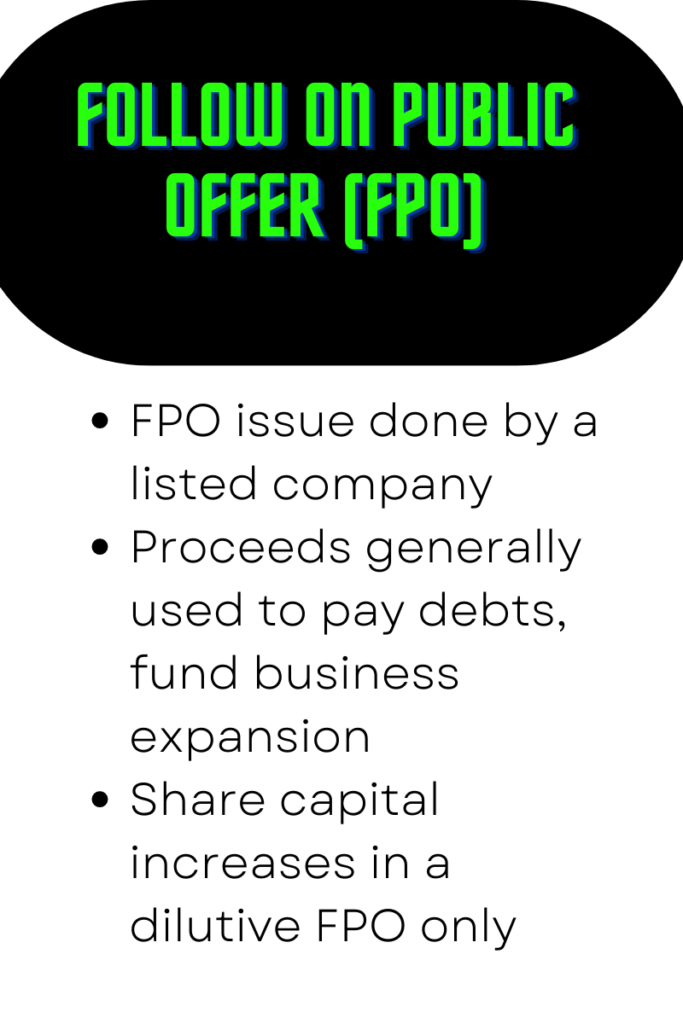A Follow-on Public Offer (FPO) is share issuance by a company listed on stock exchange. It is an additional issuance of company shares after it’s initial public offering (IPO). It is a way of raising additional equity capital to meet a company’s operational needs or expansion plans. Typically companies announce a FPO to raise capital or reduce debt.
Table of Contents
Types of Follow On Public Offer (FPO)
Dilutive Offering
In a dilutive offering, the company issues additional shares to raise capital and offers those shares in the open market. As the number of shares increase, the earnings per share (EPS) decrease. A dilutive offering is generally done to pay off debts or change the capital structure of the company.
Non dilutive Offering
In this case, company founders or promoters, board members or pre-IPO investors sell shares privately held by them to the public. Cash proceeds from the sale of shares go directly to the shareholders selling the shares in the open market. The company does not receive any cash from non dilutive offering. There is no impact on the earnings per share (EPS) as no new shares are issued. Non dilutive offerings are also called secondary market offerings.
At the Market (ATM) Offering
This FPO allows the companies to raise funds based on the real time price of the shares. If the company is not satisfied with the price of the share on a given day, then it can pull out from offering shares to the public. ATM offerings are also called controlled equity distributions due to their ability to sell shares in the secondary trading market at the current prices.

Examples of FPO
Tata Steel (2011)
Tata Steel issued 5.7crore shares as a part of FPO in 2011. The proceeds from the FPO were used by the company to fund its expansion project in Jamshedpur and for repaying debt.
Power Grid Corporation (2013)
Power Grid Corporation offered 78.70 crore shares as a part of FPO in 2013. The FPO proceeds were used for transmission projects and general corporate purposes.
Ruchi Soya Industries (2022)
Ruchi Soya Industries raised Rs 4,300 crore via FPO in 2022. The company used the proceeds to pay off loans to banks and become debt free.
Benefits of Follow On Public Offer (FPO)
The primary reason for a FPO is to raise more capital or equity. There are many reasons why a company may want more equity. A company may want to use the FPO proceeds to pay off the debt and improve or maintain a desired debt-to-value ratio. A company may want to raise equity capital to fund business expansions, finance new projects and acquisitions rather than increased debt and related interest expense to finance the same.
FPO v/s IPO
| FPO | IPO |
| Issue of shares by a company to raise additional capital after IPO of the company. | The first public issue of shares by a company. |
| A company already listed on stock exchange issues an FPO | An unlisted company issues an IPO |
| Share price is dependent on number of shares and is market driven. | Share price is fixed or has a variable price range. |
| Share capital increases in a dilutive FPO as there is cash infusion. There is no change in share capital in a non dilutive FPO. | Share capital increases as the company issues fresh capital to the public for listing on stock exchange. |
| FPO is relatively cheaper | IPO is very expensive |
| FPO is considered to be less risky | IPO has more risk |



